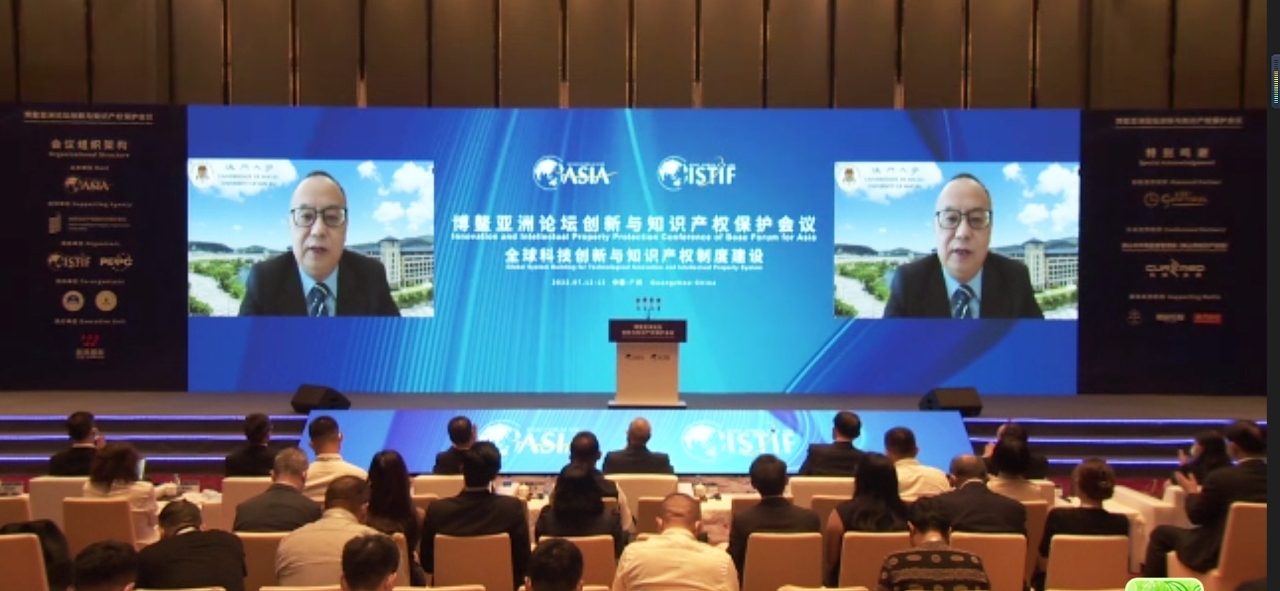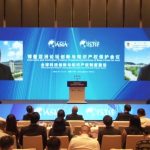 Yonghua Song delivers a speech online
Yonghua Song delivers a speech online
A conference on innovation and intellectual property (IP) protection as part of Boao Forum for Asia 2022 was held on 12 July and 13 July in both an online and in-person setting. During the plenary session, University of Macau (UM) Rector Yonghua Song gave an online speech on technological innovation and the construction of IP ecosystems and shared his views and UM’s experience in this area with guests from the political and business world as well as the academia around the world.
With a theme on global technological innovation and IP systems, the plenary session focused on the construction of global IP protection systems to facilitate the development of technological innovation and a knowledge-based economy. The event attracted over 200 guests from different places, including Ho Hau Wah, vice-chairman of the Chinese People’s Political Consultative Conference; Li Baodong, secretary general of Boao Forum for Asia; as well as heads of the World Intellectual Property Organization and China National Intellectual Property Administration.
Rector Song began his speech by discussing the macro level of social development. He argued that a new round of technological revolution and technological breakthroughs will mostly arise from the cross-evolution and mutual promotion and integration of multiple disciplines, which will drive a change in research paradigms. According to him, adopting a mindset of systems engineering to drive the change in research paradigm for effective access to technological innovation is crucial to the success of technological innovation. In the past few years, UM has adopted a highly focused and refined path in scientific research — an approach of highlighting unique features, bringing existing advantages into full play, reaching new heights, and strengthening collaboration. The university also adheres to the ‘P.I.C.K.’ strategies (problem orientation, interdisciplinary interaction, collaborative innovation, and knowledge translation), and has formulated a ‘3+3+3+3’ strategic research layout as the backbone of its research development to promote interdisciplinary collaboration.
From the perspective of technological competition at the national level, IP has become a core element of international competitiveness. Rector Song pointed out that there are three points worth considering in the process of shifting from building an IP power to building an IP superpower. 1. It is important to create a strategy to protect the IP rights of key core technologies while laying out a forward-looking research strategy, with the objective of assisting small and medium-sized enterprises to jointly innovate and develop, in order to form industrial clusters. It is not only necessary to have a good grasp of the relevant technical fields, but also to have a comprehensive analysis of relevant industries, markets, and competitions. The development of such capabilities is one of the keys to building an IP ecosystem. 2. The effective operation of IP rights is another key element of an IP ecosystem. IP rights can be used to maintain a competitive advantage in new products, technologies and designs in order to beat competitors and gain more profits or a larger market share. 3. In promoting the use of knowledge to generate economic benefits and create new value and wealth, it is important to understand that basic research at the scientific and technical levels remains the cornerstone of a knowledge-based economy.
After 40 years of development, UM has accumulated a number of advanced technologies with market application prospects. In terms of the policy framework for the management and protection of IP rights, the university has established well-defined regulations, including the Regulation of Management of Intellectual Property for University of Macau and the Rules of Management of Intellectual Property for University of Macau. The number and quality of patented technologies at UM have been growing rapidly, with a number of them now licensed to commercial companies through UMTec Limited. In 2019, UM’s Centre for Innovation and Entrepreneurship received approval from the Torch High Technology Industry Development Centre of the Ministry of Science and Technology to join China’s national system of co-working space and has now incubated over 40 start-up companies. In the same year, UM established the Zhuhai UM Science & Technology Research Institute in the Guangdong-Macao In-depth Cooperation Zone in Hengqin to provide concrete support for the university's projects of industry-academia collaboration in mainland China, especially in the Greater Bay Area. To date, the institute has undertaken over 100 research projects at national, provincial, and municipal levels as well as over 50 commercial collaborative projects.


